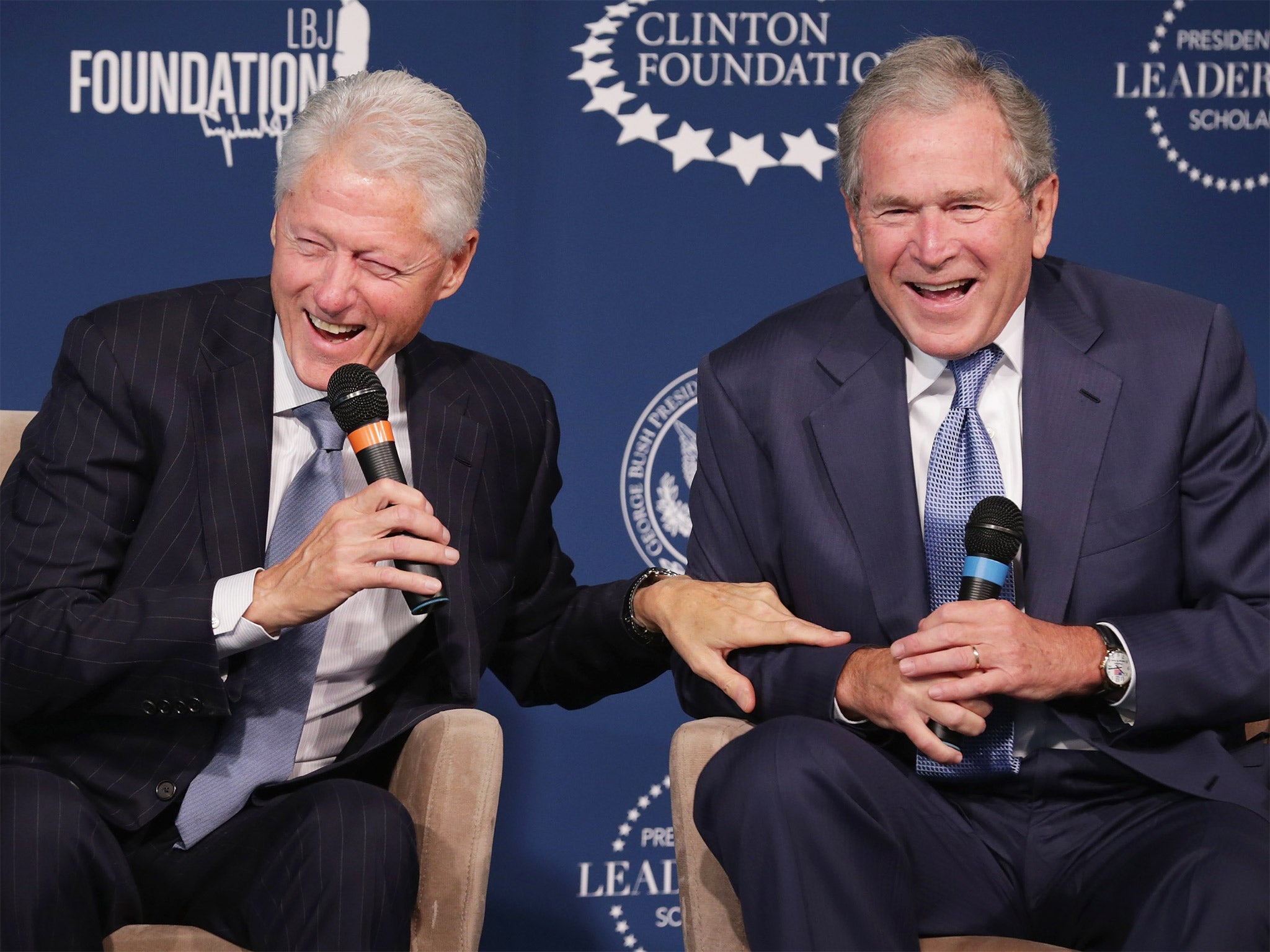Clinton and Bush double act launches bipartisan scholars' programme
The 42nd President spoke of his 'great admiration' for the 43rd – even when he did not agree with his decisions

Bill Clinton and George W Bush have rarely shared any political views – unless you count the one from behind the desk in the Oval Office. But while their parties remain perpetually at war, the two former Presidents gladly heaped each other with praise as they appeared on stage together this week to launch a new leadership scheme for young people.
Sitting alongside the 43rd President at the Newseum in Washington DC on Monday, the 42nd spoke at length of his “great admiration” for Mr Bush’s “clarity and decisiveness” – even when he did not agree with his decisions. Mr Clinton said he had “learned a lot” from his successor. Returning the favour, Mr Bush described Mr Clinton as “an awesome communicator”, adding: “You, too, have got great empathy... You, too, made tough decisions... And so, um, yeah. Is that enough?”
“You don’t do nuance,” Mr Clinton replied.
The two men were there to introduce the “presidential leadership scholars” programme, a collaboration between their presidential libraries and those of Lyndon Johnson and Mr Bush’s father, George HW Bush, the 41st President. One of the key leadership skills taught by the programme, Mr Clinton promised, would be “the skill that we are beginning to see atrophy in America, which is listening to people who disagree with us”.
The two erstwhile commanders in chief were a picture of bipartisanship, exchanging handshakes, stories and pally jokes at odds with the political sparring of their past. In public, Mr Bush campaigned for the Presidency in 2000 with a pledge to restore “honour and dignity to the White House” following Mr Clinton’s tenure, while Mr Clinton criticised the Bush administration for its environmental policies and for the Iraq War.
In private, however, Mr Clinton became a valuable confidante to Mr Bush. “He used to call me twice a year in his second term, just to talk,” Mr Clinton recalled. Their regular conversations would last between 30 and 45 minutes, depending on how much time Mr Bush had to spare. “We talked about everything in the wide world,” Mr Clinton went on. “He asked my opinion.”
Clinton said the test of any democracy is finding ways of having a vigorous debate and still reaching resolution to the nation’s problems. “If you read the Constitution, it ought to be subtitled, ‘Let’s make a deal’,” Clinton said.
The warming of relations between the two former Presidents followed a friendship between George HW Bush and Bill Clinton.
In All The Best, George Bush; My Life in Letters and other Writings, Mr Bush senior recounted a trip he, President Clinton and former Presidents Carter and Ford had just taken to attend the funeral of Jordan’s King Hussein in February 1999. He saw in Mr Clinton “a great grasp of facts, apparently an in-depth knowledge on the issues. I disagree with many of the administration’s positions that he outlined for us”.
At the launch Mr Bush and Mr Clinton appeared to enjoy each other’s company and were tactile with each other, shaking hands and touching the other’s arm to make a point.
In a letter read out to the Newseum gathering, Mr Bush senior, who celebrated his 90th birthday in June by making a tandem parachute jump, urged the two former Presidents to “keep it brief”.
Since leaving office, Mr Clinton has maintained a high profile as the figurehead of an international humanitarian organisation, the Clinton Foundation.
Mr Bush, by contrast, retreated to his ranch in Texas to paint and to write 41, a biography of his father due to be published in November. When Mr Clinton complained at how often he is asked to pose for photographs in public, Mr Bush quipped: “At least they’re still asking.”
At one point, Mr Clinton’s phone rang; switching it off, he said that he hoped it wasn’t a member of his family calling to tell him that he was “about to become a premature grandfather”. Mr Clinton’s daughter Chelsea is expecting, so Mr Bush offered him some advice on grandfatherhood: “Get ready to be the lowest person in the pecking order in your family,” he said.
An enmity between the Bush and Clinton families began at the 1992 Presidential election, when Mr Clinton deprived Mr Bush’s father of a second term in the White House. Yet the two men later worked together on relief efforts following the Asian tsunami in 2004 and Hurricane Katrina in 2005.
Some have predicted a re-run of their rivalry, with Mr Bush’s brother Jeb running against Mr Clinton’s wife, Hillary, for the presidency in 2016. Ms Clinton, the former US Secretary of State, was in the audience at Monday’s event. Asked about the prospect of a second Bush-Clinton contest, Mr Bush was wary, saying: “The first one didn’t turn out so good.”
Join our commenting forum
Join thought-provoking conversations, follow other Independent readers and see their replies
Comments